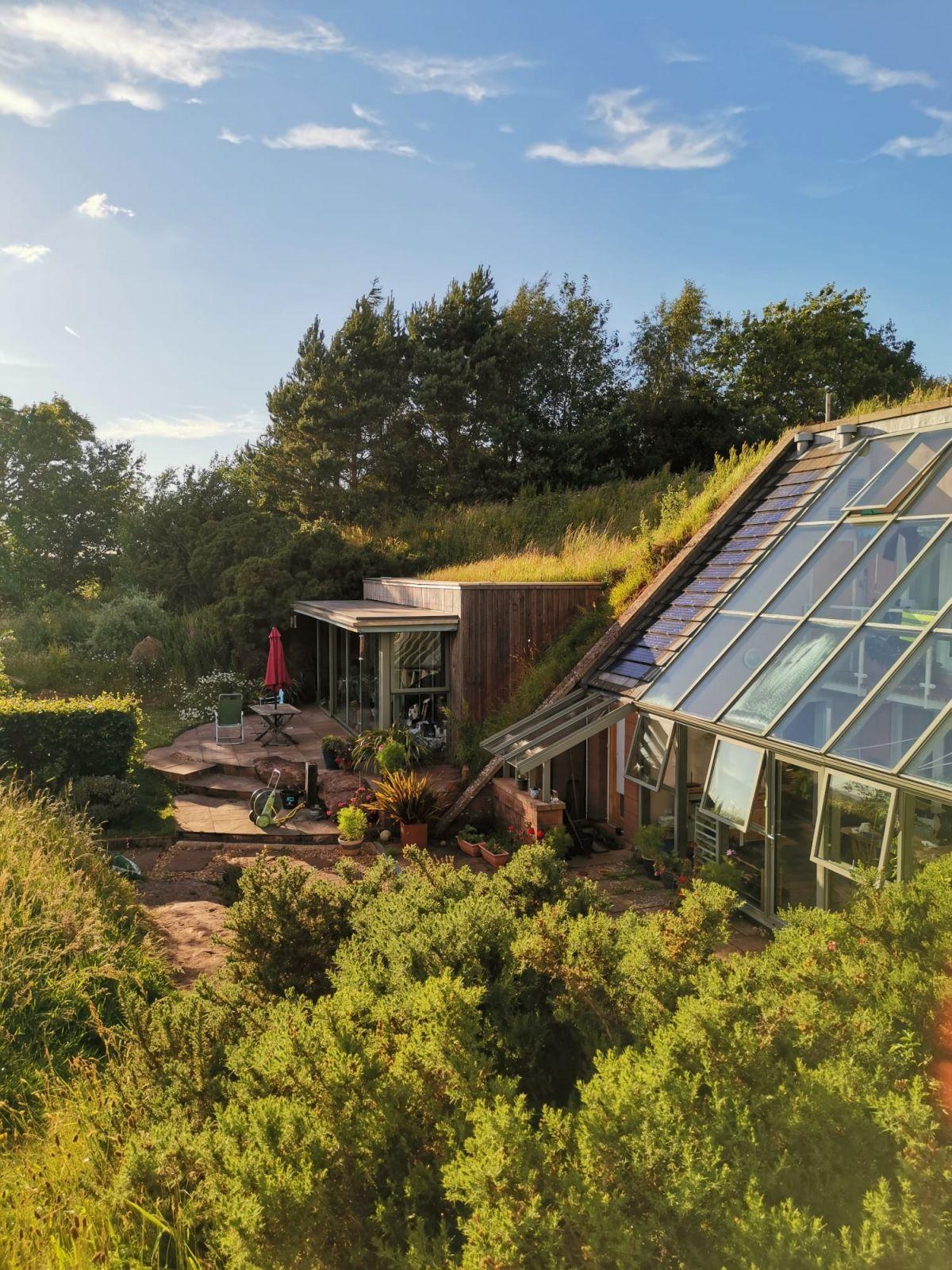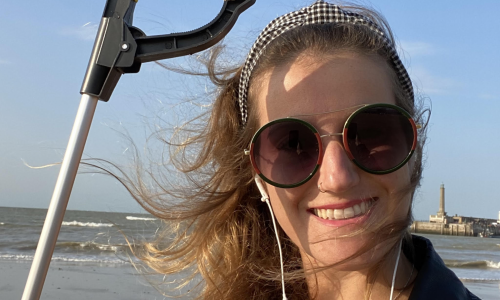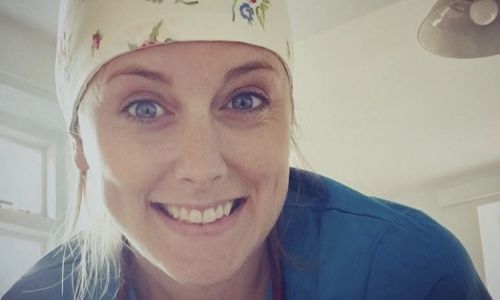Meet Helen: Practice owner and eco champion
"I love working with my ace team who have embraced our green journey and are a joy to be around. In a small practice it's easier to bring about changes and foster the culture you want."
Helen Gould
Hi! Please tell us who you are and what you do
Hi, I'm Helen Gould, vet and owner of Old Hall Vets, a small animal practice in Cumbria and winners of the Greenest Vet Practice Award 2022!
What is your current role and your professional interests?
I'm a small animal clinician as well as doing quite a bit of practice management. I enjoy (mostly!) the responsibility of running the team and am so fortunate to have a fantastic group of people to work with.
Professionally, I love all aspects of being a vet. The variety in our workload is such a huge plus-point. I particularly enjoy the relationships we develop with our clients which, in a small community like the one I work in, add so much more depth to life.
I specialise in Traditional Chinese vet acupuncture. This is such a valuable drug free treatment which helps our patients enormously and, due to the length of consultations, enhances the client-vet-patient bond. That also gives me more time to talk about sustainability!
It's hard to remember a time when I wasn't interested in the environment and sustainability. Twenty years ago my late husband and I built our own underground ecohouse. You may have seen it on Grand Designs!
What does a typical day look like for you?
After the school bus run I always walk the dog, getting a boost of nature to start the day. Then into the practice to do some day-to-day admin and management before consultations and acupuncture. Increasingly, the management is more and more focussed around green issues. We have regular practice meetings and the environment is a constant agenda item. This means everyone is involved in some way.
After work maybe some exercise or time spent in the garden where I grow a lot of vegetables and have large wild areas. Compost made at work from paper towel and dog hair is proving very successful in the veg patch.
"On days off amongst doing family stuff I volunteer at school or with the local Green Party and catch up with friends for a walk or bike ride. Nature and biodiversity are very important to me."
What is your favourite part of the job?
Probably using acupuncture which I've been doing for 35 years. I love the fact it's a drug-free treatment and the longer sessions allow a strong vet-client bond to develop, resulting in a better understanding of the animal. I get to meet some interesting people and chat about all sorts!
I love working with my ace team who have embraced our green journey and are a joy to be around. In a small practice it's easier to bring about changes and foster the culture you want. I realise I'm very lucky in this.

What is the most challenging part of your job?
Seeing yet another brachycephalic puppy come in, knowing it will have a lifetime of problems, a multitude of frustrating and difficult to manage clinical situations, a consequently higher carbon pawprint and owners who just don't get it.
Do you have any tips for achieving a good work-life balance?
Rota yourself a day off. Get out in nature. Volunteer. Laugh and dance with friends.... or whatever floats your boat! Don't aim for perfection, it's OK to be good enough.
How do veterinary professionals currently help to drive sustainability?
Vet Sustain are doing some amazing work in bringing the environment to the attention of the profession and giving us the tools and knowledge to drive change. There are so many others working in the field as can be seen in these stories and case studies. We can all learn from and support each other.
Now the BVA and RCVS are also highlighting the issues. The more mainstream sustainability becomes, the easier it will be to effect change. It's fantastic to see.
What do you feel are the major opportunities to drive sustainability in the veterinary sector?
We need to work further to reduce the widespread use of pesticides in companion animals and reduce the climate and biodiversity impact of our pets. It would be good to see more studies in this area.
"As vets we are trusted professionals who are seen to have integrity and balance. We are likely to be listened to and should use our voices to get the messages out there in both the companion animal and food sectors."
We can also influence our suppliers if we all speak with a common voice, demanding less waste, asking to see environment policies, holding others to account. If your drug rep tries to give you a plastic freebie, pull them up on it. The same for the wholesaler still using plastic bags. Let people know what you think.
What are your top tips for veterinary professionals wishing to take the first steps to drive sustainability in their roles?
I'll focus on vet practice as that's what I know!
Firstly, it's good to know where you are before you start. Try to do a quick carbon footprint calculation for your previous year. You can probably find out how much fuel, water etc has been used from bills. You can also work out anaesthetic use (a big one!) from your stock records. Keep recording so you can see the changes.
Then start with a few easy wins. Low flow anaesthesia is a good one. Composting was a big one for us. Don't try to change everything at once. It will be too much for some and you'll lose support. It won't be long before the doubters are enthusiasts and you can pick up speed.
"Involve everyone and work to each person's strengths. Our tidy freak receptionist loves doing the recycling. Another enjoys talking to clients so has the job of recording who has come by bike or car (we plant a tree for each sustainable journey). Our more scientific vet is researching alternative treatments to antimicrobials and drawing up protocols. The nurse who does the orders loves finding green alternatives and phoning the wholesalers to ask for more info. Giving responsibilities engenders a greater level of interest and gives everyone a stake in the process."
Make the environment an agenda item at every meeting. Other staff members will bring items to discuss. Just this week someone had seen water butts for sale and thought we should have one.
Each small change adds up. Make the most of all the help out there. Join Vet Sustain's facebook group or many of the other groups where you can get support and ask questions. Use the community, together we are stronger.
If you could wave a magic wand and make one improvement to drive the sustainability impact of the veterinary profession, what would it be?
For it to be the norm for everyone to ask 'What is the environmental impact and how can I reduce it?' before they make any decision. Be that procurement, protocols, communication, clinical decisions.... everything. From practices to pharmaceutical companies to universities. Everyone.



